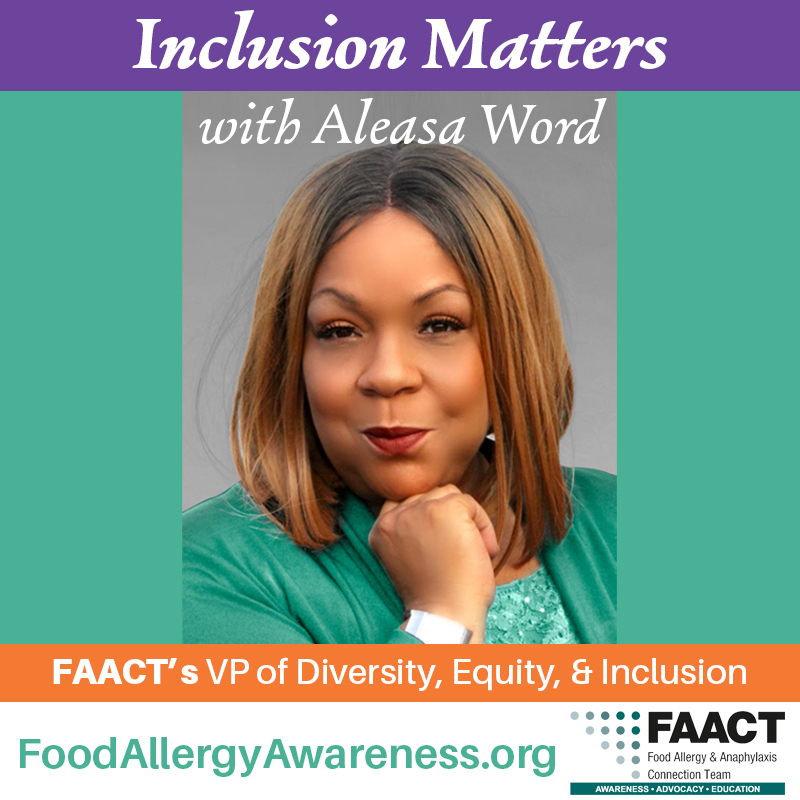Honoring Hispanic Heritage Month: The Culture, The Food, and Our Reflections of Food Allergy Management Along the Way
Subcategories

Honoring Hispanic Heritage Month: The Culture, The Food, and Our Reflections of Food Allergy Management Along the Way
by Aleasa Word, FAACT Vice President of Diversity, Equity, and Inclusion
September 2024
National Hispanic Heritage Month is celebrated annually from September 15 to October 15 and pays tribute to the heritage and contributions of Hispanic and Latino communities in the United States. This is both a celebration of the contribution of Hispanic and Latino people but also a time to reflect, appreciate, and recognize the diversity within these communities.
Hispanic Heritage Month, originally known as Spanish Heritage Month, was first recognized in 1968 by President Lyndon Johnson. This is a month to recognize histories, cultures, and contributions of Hispanic and Latino Americans who have enriched the United States and the world in too many ways to count. Their influence has run from art and literature to science and politics, into all walks of life.
FAACT seeks to be inclusive of all communities, and it is quite the pleasure to explore Hispanic Heritage Month and how different cultures within the Hispanic and Latino communities deal with food allergies, blending their traditions with health needs.
Food as a Cultural Pillar
The centrality of food to many people, including those aligned to Hispanic and Latino communities, often serves as an expression of culture. Most times, the dishes are made with a lot of history and tradition for preservation as well as creating a connection with the past and cultural identity. The tamales from Mexico, the arepas from Venezuela, or the arroz con gandules from Puerto Rico—these dishes carry the spirit and history of their origin.
Many families face dilemmas as they struggle to carry on these traditions without putting the health of their food-allergic loved ones at risk. Food allergies run the gamut from peanuts, shellfish, and dairy to fruits, seeds, and more. Every culture develops its ways of dealing with these allergies, usually using a combination of up-to-date medical advice along with the age-old practice of avoidance.
Addressing Food Allergies Among Hispanic and Latino Cultural Groups
The management of food allergies in Hispanic and Latino communities can be complicated. Cultural practices, language barriers, and disparities in access to healthcare services can complicate the landscape of allergy management. Yet these same communities show breathtaking resilience in finding ways to honor culinary traditions while keeping their families safe.
- Adapting Traditional Recipes: The most common way Hispanic and Latino families manage food allergies is through changes to traditional family recipes. If a child is allergic to milk, for example, recipes involving dairy products such as quesadillas or flan can be prepared using dairy-free substitutes. Dishes made of corn, such as tamales, offer a good alternative for people who have issues with wheat or gluten. However, strict caution is needed to ensure cross contamination does not occur.
Families can take the opportunity to be creative with substitutions that will retain or add to the flavor and cultural value of a dish. This allows them to not only keep the culinary culture of their ancestors alive but also ensure that all can partake in the meal, including those with allergies to food.
- Promoting Allergy Awareness in Community Celebrations: Community gatherings and celebrations are plentiful in many Hispanic and Latino cultures, from quinceañeras to weddings and fiestas. For the most part, these functions include traditional foods that can be hard for someone to navigate if they have a food allergy.
Event hosting today increasingly incorporates forethought to accommodate food allergies and other needs by labeling dishes, offering alternative foods, or even pre-interviewing guests so their needs can be met. This shift reflects a broader understanding of the need for inclusivity and safety in communal settings.
- Navigating Food Allergies Across Generations: Food allergy awareness and education can vary between generations. No matter what culture you are a part of, some people find it tough to understand the seriousness of food allergies because previous generations did not grow up with the same level of knowledge and awareness that we have today. Education and communication are the keys to successful family gatherings. Younger family members can educate their elders about the importance of staying away from some foods and about the dangers of cross contamination. Intergenerational dialogue should ensure that traditional foods can be safely enjoyed by everyone in the family.
Cultural Sensitivity in Food Allergy Management
There is a call for understanding and respect for cultural differences in food allergy management. Health care professionals and educators should strive to be aware of the unique challenges faced by Hispanic and Latino communities as well as other cultures and families when it comes to food allergies. For example, making resources and education available in Spanish will markedly influence how well a family handles food allergies. In addition, advice or treatment options must be preceded by some considerations for cultural preferences and values. This has the potential to foster more trust between communities and the medical professionals who choose to serve them
Hispanic Heritage Month is about celebrating the richness of Hispanic and Latino people's cultures and how much they mean to society as a whole. Hispanic and Latino communities are models of a mix of traditions with modern safety practices, and they exhibit resilience and creativity in the preservation of their culinary heritage. While we celebrate Hispanic Heritage Month, let us also put into memory the sensitivity of various cultures when it comes to managing food allergies.

